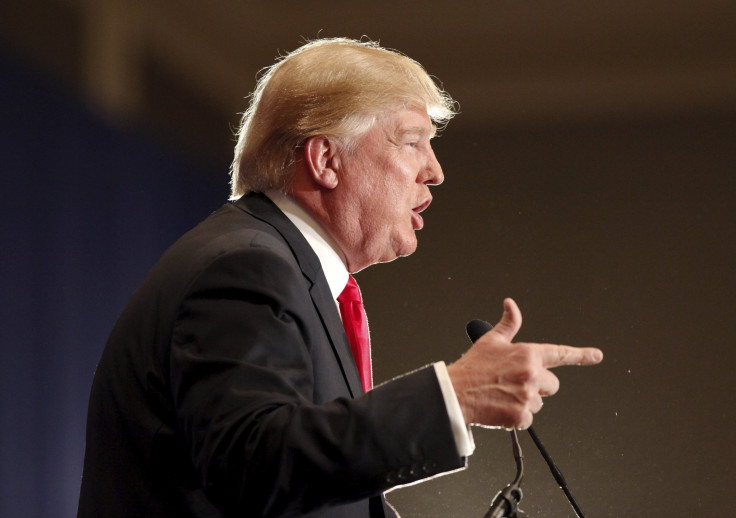Donald Trump’s win as US president considered a high impact global risk

Donald Trump winning the US presidential election is one of the worst global risks, according to the Economist Intelligence Unit (EIU). The British research group ranked the victory of the Republican candidate with a risk factor of 12, while China’s “hard landing” is at number one with a rating of 20.
EIU’s Global Risk assessment says if Trump won the US presidency, it would mean trade and world security war, as well cause internal bickering. It gave the possibility a risk intensity of 12, which means moderate probability, high impact.
Donald Trump wins the US presidential election
Trump, who appears to be the favourite to win the Republican party’s primaries, has been exceptionally hostile towards free trade, labelling China as a “currency manipulator.” The assessment also noted the real estate mogul/reality show star’s right-wing stance on the Middle East and terrorism.
“In the event of a Trump victory, his hostile attitude to free trade, and alienation of Mexico and China in particular, could escalate rapidly into a trade war – and at the least scupper the Trans-Pacific Partnership between the US and 11 other American and Asian states signed in February 2016. His militaristic tendencies towards the Middle East (and ban on all Muslim travel to the US) would be a potent recruitment tool for jihadi groups, increasing their threat both within the region and beyond.”
Although EIU does not expect Trump to defeat Democratic contender Hillary Clinton, whom they think would win to represent her political party, if Trump did win, it would mean disaster on a national and global scale.
“It is worth noting that the innate hostility within the Republican hierarchy towards Mr Trump, combined with the inevitable virulent Democratic opposition, will see many of his more radical policies blocked in Congress – albeit such internal bickering will also undermine the coherence of domestic and foreign policy making.”
China experiences a hard landing
With a risk intensity of 20, which means high probability, very high impact, China suffering a sharp economic slowdown tops the EIU’s global risk assessment. The intelligence report fears that the Chinese government’s means to revive its economic confidence are limited and not enough.
It noted the Asian giant’s deterioration of services and manufacturing sector, its ongoing build-up of debt stock and the continued capital outflows that resulted in the depreciation in the renminbi’s exchange rate against the US dollar.
“If China’s economy slows by more than we currently expect, it will further feed the ongoing global commodity price slump (especially in oil and, in particular, metals), with a hugely detrimental impact on those Latin American, Middle Eastern and Sub-Saharan African states that had benefited from the earlier Chinese-driven boom in commodity prices. In addition, given the growing dependence of Western manufacturers and retailers on demand in China and other emerging markets, a prolonged deceleration in growth, there would have been a severe knock-on effect across the EU and the US – far more than would have been the case in earlier decades.”
Chinese expansionism prompts a clash of arms in the South China Sea
The tensions in the South China Sea also made the cut with a risk intensity of eight (low probability, high impact). China is already involved in multiple island disputes from the region with its neighbours (Malaysia, Vietnam, the Philippines, South Korea and Japan), and, with its continued expansion in the disputed islands and waters, is feared to worsen diplomatic rows.
“Any worsening of the row could seriously undermine intra-regional economic ties, and potentially interrupt global trade flows and simultaneously depress global economic sentiment more broadly.”
The Economist Intelligence Unit’s Top Global Risks:
- China experiences a hard landing (global risk intensity: 20)
- Russia’s intervention in Ukraine and Syria precede a new “cold war” (global risk intensity: 16)
- Currency volatility culminates in an emerging markets corporate debt crisis (global risk intensity: 16)
- Beset by external and internal pressures, the EU begins to fracture (global risk intensity: 15)
- “Grexit” is followed by a euro zone break-up (global risk intensity: 15)
- Donald Trump wins the US presidential election (global risk intensity: 12)
- The rising threat of jihadi terrorism destabilises the global economy (global risk intensity: 12)
- The UK votes to leave the EU (global risk intensity: 8)
- Chinese expansionism prompts a clash of arms in the South China Sea ((global risk intensity: 8)
- A collapse in investment in the oil sector prompts a future oil price shock (global risk intensity: 4)





















